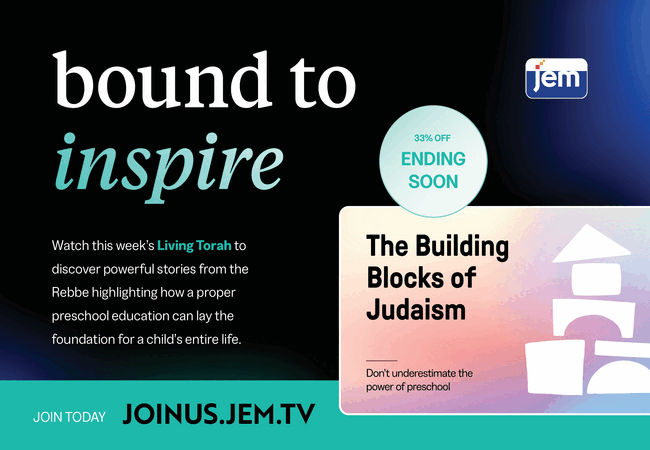
Model Matzah Bakeries: Hands-On Entertainment and Education
An increasing number of children from all walks of Jewish life touch, feel and learn about ancient Passover traditions at Chabad-Lubavitch model matzah bakeries.
Gloria Stermer has been taking her children to bake matzah for years. “I started with my older kids, and here I am again,” she says, nodding toward daughter Hailey Murad, preschool student in Montreal. “The rabbis who direct the bakery do a fabulous job. They keep getting better and better.”
Randy Mendel, director of Solomon Schechter Early Childhood Department, concurs. “Rabbi Pinny and Rabbi Dovid are so animated, and you can tell that they really love kids. The program is interactive and engaging. The model matzah bakery is an important part of how we teach” about Passover, “so I made sure to book the dates for our program in December.”+
During the recent hour-long presentation, Hailey Murad and approximately 80 other toddlers laughed and cheered as they baked matzah, the thin cracker-like food eaten on Passover to commemorate how the ancient Israelites left Egypt in such a hurry that they didn’t have time to allow the dough to rise.
Rabbi Dovid Weinbaum, program director for the Living Legacy of Montreal – whose model matzah bakery will accommodate up to 5,000 children in the weeks before Passover – says he and Rabbi Pinny Gniwisch, who directs the organization, put a lot of work into making sure that their programs are educational, entertaining and well-run.
The rabbis oversee a number of stations. There is the wheat-grinding room, where a “farmer” has the children operate a hand mill, crushing the wheat into flour. That is also where to the rabbis tell the Exodus story in a manner that has the children giggling in their seats. The next stop is the bakery, which is divided into two sections. In one area, kids get to stand in a specially built structure to mix flour and water, and then knead the dough. In another area, they line up at tables and roll out their dough, then watch as their matzah gets placed into a brick oven on a wooden peel.
“We try as hard as we can to ensure that our model matzah bakery is a true representation of the real thing,” explains Weinbaum. “The key to baking matzah is that the water and flour must not be in contact for more than 18 minutes before they are placed in the oven, because any more than that and the mixture will become chametz (leaven), which we may not consume or even own on Passover. We show the kids how the equipment must be dry before we begin mixing, and that we keep the flour and water in separate structures until the moment they mix, just like in matzah bakeries. “
The Montreal model matzah bakery is part of a chain of hundreds of similar ones around the world. Chaya Fleishman works at the Chabad-Lubavitch Shluchim Office, which supplies Chabad emissaries with materials for the bakeries. She reports that her office sells more than 100,000 bakers’ hats every year printed in four languages: English, French Spanish and German. Bakeries in Israel and other parts of the world manufacture many more. And the numbers keep increasing.
Rabbi Shmuel Posner, who operates a model matzah bakery out of Young Israel of Brookline, Mass., says his clientele continues to grow in the 25 years he’s been running it. “We made contact with schools over many, many years, and the kids just love it. They look forward to it. The teachers see what a great effect it has because at the bakery, the things kids study become real.”
In Toronto, more than 3,000 children come annually to the Chabad Lubavitch Community Centre to make matzah in a fully outfitted model bakery that includes an authentic oven. According to Rabbi Moshe Spalter, “We have children who come to our programs from literally every sector. There have been Boy Scout troops, Reform schools, fervently Orthodox schools, public schools, and even groups from other cities. And then there are the adults. We have senior groups who have participated and had a blast. Passover is a tradition treasured by all Jews. We all eat matzah, and we can all learn.”
In some communities, the matzah bakery travels from place to place. In Salem, Oregon, Rabbi Avrohom Perlstein loads his van and reaches 250 kids in cities such as Portland, Eugene and Bend. “We go the extra mile to make sure that our equipment looks and feels like the real deal, so getting everything into minivan can be a challenge, but it’s worth it.”
When asked why he still operates the model matzah bakery after 25 years, Gniwisch – also an adjunct professor at McGill University, and a successful entrepreneur and speaker – replied: “In one word, it is ‘curiosity.’ I love to see the faces of the children when the light bulb flashes in their heads and they get it. I want them to remember that mitzvahs are fun.”













